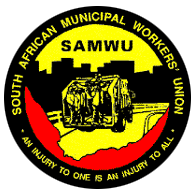South African Municipal Workers' Union
South African Municipal Workers' Union | |
 | |
| Founded | 1987 |
|---|---|
| Headquarters | Johannesburg, Gauteng, South Africa |
| Location | |
| Members | 160,000 |
Key people | Nelson Mokgotho, President Koena Ramatlou, General Secretary Papikie Mohale, National Spokesperson |
| Affiliations | COSATU, PSI |
| Website | www.samwu.org.za |
The South African Municipal Workers Union (SAMWU) is the largest union in local government in South Africa.
History
[edit]The union was founded on 24 October 1987, when the Municipal Workers' Union of South Africa merged with the Cape Town Municipal Workers' Association (CTMWA), and the municipal workers' sections of General Workers' Union of South Africa, South African Allied Workers' Union and Transport and General Workers' Union. All of these unions were affiliates of the Congress of South African Trade Unions, to which SAMWU also affiliated. In later years, SAMWU absorbed the Durban Indian Municipal Employees' Society and the Union of Johannesburg Municipal Workers.[1]
Initially, the union grew rapidly, and by 1994 it had 100,410 members, 31.3% of all eligible workers.[2] The union led opposition to privatisation schemes, and was particularly active in opposing the privatisation of a water treatment plant in Johannesburg. In 2002, it led a national three-week strike for higher wages.[3]
In 2009, the union's leadership was voted out, and disagreements around this led the Democratic Municipal and Allied Workers' Union of South Africa and the Municipal and Allied Trade Union of South Africa to split away over the next few years.[3] The leadership lost a vote of confidence in 2019 and were replaced. The new leaders found that the union was insolvent, with some having been spent on legal costs and some was used for inappropriate purposes. In addition, membership was in decline.[4][5] In 2020, the union declared that it might withdraw support for the African National Congress government.[6]
Membership of the union is open to South African workers employed, directly or indirectly, in local authorities, water utilities and allied undertakings of the economy whether in the public, private or voluntary sector, including: public administrative services in municipalities and local authorities, health and social services, libraries, cultural and other community services, water and sanitation, solid-waste management and environmental services, road construction and storm-water drainage, electricity generation and distribution, public transportation and traffic control, telecommunication and information services, scientific and technical services, and parks and recreation.
Leadership
[edit]General Secretaries
[edit]- 1987: John Ernstzen
- 1990s: Roger Ronnie
- Walter Theledi
- 2015: Simon Mathe
- 2019: Koena Ramotlou
- 2021: Dumisane Magagula
Presidents
[edit]- 1987: Petrus Mashishi
- 2009: Sam Molope
- Pule Molalenyane
- 2019: John Dlamini
- 2020: Nelson Mokgotho
References
[edit]- ^ Musi, Mojalefa (2010). Evaluating IMATU and SAMWU policy responses to Igoli 2002. Johannesburg: University of the Witwatersrand.
- ^ Catchpowle, Lesley (2002). A Case Study of the South African Municipal Workers' Union (SAMWU) in the Western Cape (1992-1997) (PDF). Greenwich: University of Greenwich. Retrieved 18 March 2021.
- ^ a b Majavu, Anna (30 April 2021). "Wycliff Mabusela: fighting corruption in unions". New Frame. Retrieved 2 May 2021.
- ^ Mahlakoana, Theto (10 April 2019). "SAMWU ADMITS IT IS INSOLVENT AS IT BATTLES TO PAY SALARIES". Eyewitness News. Retrieved 19 March 2021.
- ^ "Samwu 'notes' allegations of grand-scale looting of workers' funds". Independent Online. 21 May 2019. Retrieved 19 March 2021.
- ^ "Samwu is questioning its support of the ANC". Business Day. 9 December 2020. Retrieved 19 March 2021.
External links
[edit]- SAMWU official site.
